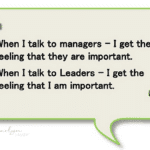One of the most important responsibilities we give to managers is employee performance. Organizations ask managers to set performance standards, communicate those standards, and train employees to deliver. Creating high performance isn’t a goal; it’s a key component of a manager’s job.
Frankly, it’s a big job. Sometimes, it’s easy to forget that. We talk about “Managers need to do this…” or “Managers must do that…” Truth is, managers need to focus on creating the conditions for high performance.
During this year’s SilkRoad Connections Conference, Mollie Lombardi, co-founder and CEO of Aptitude Research Partners, outlined a great roadmap for building high performance.
I think we’ll all agree that the conditions for high performance are those traditional talent management activities such as hiring, learning, goal-setting, and feedback. That’s the easy part! The tough part is, how do we use these talent management activities to create high performance. Lombardi recommended four strategies:
- Alignment: For high performance to exist, it must be in alignment with organizational strategies, goals, and objectives. Organizations need to agree on employee performance, both in terms of what meets the standard as well as the defined goals of high performance.
- Experience: Employees should be involved in the performance process. They need to give and receive feedback about performance. Employees will perform at a high level when they can personalize their work and have control over the way it gets done. That includes being able to simplify work processes when it makes good business sense.
- Coaching: Organizations should provide managers with training so they can effectively coach employees. Coaching isn’t something that’s only done to when an employee is performing poorly. Managers have the ability to offer positive feedback and coaching to employees so they will perform at a high level.
- Technology: We’ve heard the saying before, “more isn’t always better.” Organizations should use technology strategically to help with administration. Today’s technology solutions can help with succession planning, collaboration, learning, and performance management. More technology doesn’t mean better technology.
Every organization wants high performance from employees. To get high performance, managers need to play an active role in talent management. They have to hire the best, train them well, set relevant goals, and coach. The way that managers excel in talent management is by creating alignment, encouraging employee experiences, coaching regularly, and using technology strategically to assist.
Image captured by Sharlyn Lauby after speaking at the SHRM Annual Conference in Washington, DC
5








[…] 4 Ways Managers Can Create the Work Conditions for High Performance […]